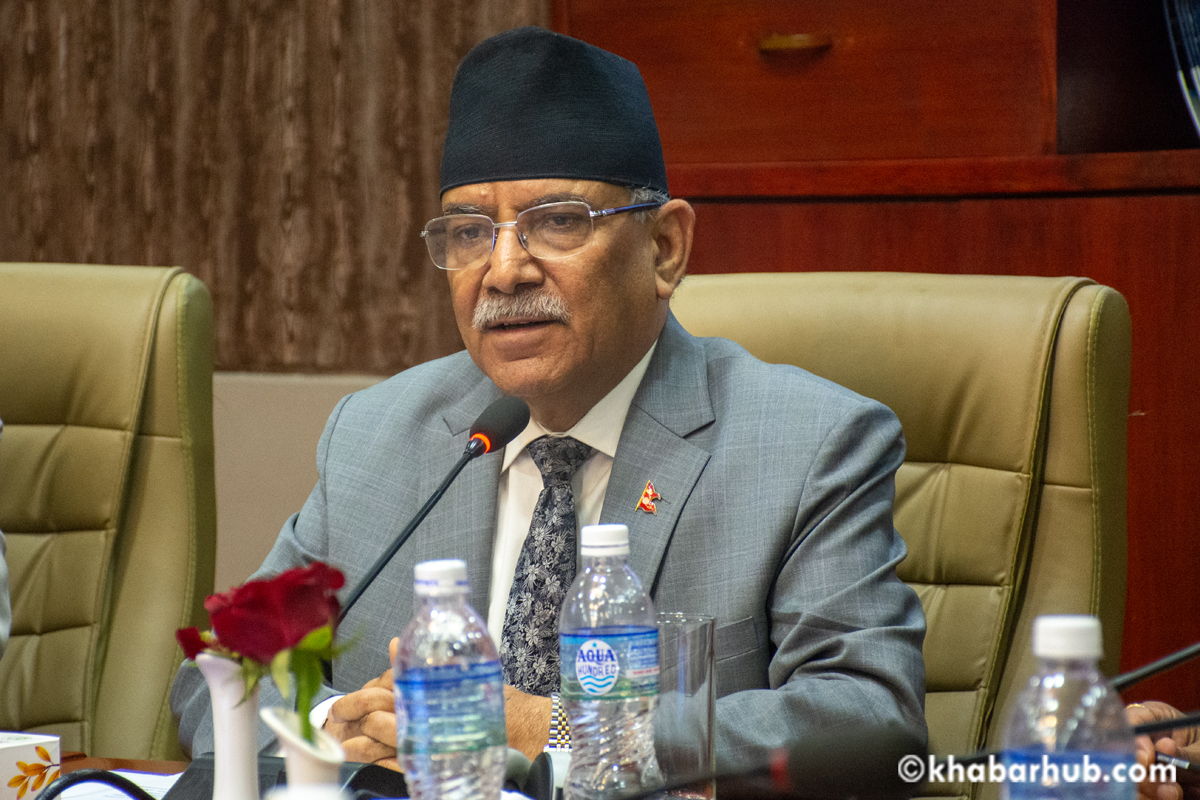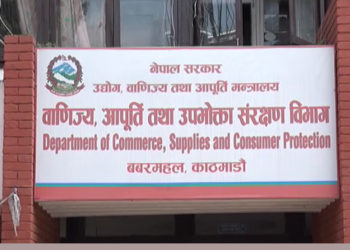KATHMANDU: Politics transcends mere arithmetic; it embodies the democratic values, governance systems, and the voice of the people.
In Nepal’s parliamentary framework, it’s not uncommon for the third-largest party, chosen by popular vote, to support the government formed by the top two parties.
This tradition, spanning nearly three decades, underscores the intricacies of power dynamics and coalition governance.
Currently, Pushpa Kamal Dahal “Prachanda,” chairman of CPN-Maoist Center, serves as Prime Minister after his party secured the third position in the 2022 House of Representatives elections with just 32 seats.
Since December 25, 2022, he has governed with the intermittent backing of the first and second-largest political parties.
This isn’t unprecedented. Previously, leaders of the Rashtriya Prajatantra Party (RPP) led governments with support from the first and second-largest parties after becoming the third-largest party in the 1994 midterm elections.
In that election, CPN-UML emerged as the largest party with 88 seats, followed by the Nepali Congress with 83 seats. RPP, securing 20 seats, played a significant role alongside smaller parties and independents.
Despite lacking a majority, CPN-UML formed the government as the largest party. This historical precedent echoes the complexities of coalition governance in Nepal.
Manmohan Adhikari, Nepal’s first communist prime minister, faced challenges governing as a minority government until a no-confidence motion led to a change in leadership.
Over the subsequent sixteen years, third-largest parties have held power for nearly four years, despite not securing the majority mandate from the electorate.
Sher Bahadur Deuba, supported by RPP, assumed office on September 1995, expanding his cabinet to accommodate coalition partners.
Nepal’s political landscape reflects not only electoral outcomes but also the ethical dimensions of coalition politics and governance in a diverse democracy.
Third-largest parties in Nepal’s parliamentary system
The country’s political scenario has seen a recurring theme: the ascension of third parties to power amidst shifting alliances of the first and second largest parties.
This practice, rooted in the country’s parliamentary history, raises pertinent questions about its alignment with democratic principles and the will of the electorate.
The precedent began in March 1997, when the CPN-UML, then the second-largest party, joined forces with the RPP, then the third party, to overthrow the Deuba government, marking the first instance of a third party assuming leadership based on parliamentary support rather than direct public mandate.
Subsequently, the Lokendra Bahadur Chand government, led by RPP, faced instability and fragmentation within seven months, underscoring the challenges of coalition governance in Nepal.
This pattern of frequent changes in leadership among major parties, often involving third parties, has been criticized for fostering instability and constitutional concerns.
Seven months later, the Chand government, led by the second-largest party, the RPP, collapsed, followed by a split within the RPP itself.
On October 7, 1997, Surya Bahadur Thapa of the third-largest party RPP became Prime Minister with support from the Nepali Congress. However, Thapa’s government proved short-lived, succumbing to instability.
This period marked a rise in constitutional manipulation and discontent in Nepal as major parties attempted to replace each other through alliances with smaller parties. Thapa’s government collapsed within six months.
Meanwhile, the practice of allowing third-largest parties to assume leadership in parliamentary system has drawn sharp criticism from constitutional experts and senior advocates, who argue that it undermines established democratic principles.
Meanwhile, Girija Prasad Koirala of the Nepali Congress assumed leadership, successfully navigating a general election where his paryt secured a single majority with 111 seats. The UML won 71 seats, and RPP secured 11 seats.
Following the election, NC leader Krishna Prasad Bhattarai became Prime Minister in May 1999.
Internal conflicts within the Nepali Congress led to his resignation despite holding a single majority. Subsequently, Koirala resumed office as Prime Minister in March 2000.
Even after the landmark first Constituent Assembly elections in 2008, where CPN-Maoist emerged as the largest party, alliances continued to shift, leading to the appointment of Pushpa Kamal Dahal Prachanda as Prime Minister.
Over the subsequent sixteen years, third-largest parties have held power for nearly four years, despite not securing the majority mandate from the electorate.
This raises significant questions about the adherence to democratic norms and the parliamentary system’s integrity.
In a democracy, the legitimacy of governance derives from electoral mandates.
The practice of third parties assuming leadership through parliamentary maneuvers challenges this principle, often sparking debates about the alignment of governance with the people’s will.
As Nepal navigates its political future, the balance between coalition pragmatism and democratic integrity remains a pivotal issue.
Meanwhile, the practice of allowing third-largest parties to assume leadership in parliamentary system has drawn sharp criticism from constitutional experts and senior advocates, who argue that it undermines established democratic principles.
Constitutionalist Dr. Bhimarjun Acharya asserts that such practices are incongruent with parliamentary norms.
“Assigning government responsibility to the third-ranked party contradicts the essence of parliamentary governance,” he said.
Dr. Acharya contends that while any parliamentarian can technically become prime minister as per constitutional provisions, governance efficacy diminishes significantly when leadership is vested in parties lacking majority popular support.
As debates on Nepal’s political future continue, the discourse around ensuring electoral mandates translate into effective governance remains central.
He further argues, “The primary function of a parliamentary system is to ensure the party with majority support governs, while others play roles based on their electoral strength. The current trend of allowing third parties to lead disrupts this balance.”
Senior advocate Bipin Adhikari echoes this sentiment, describing the elevation of third parties to governmental leadership as a disregard for the electorate’s mandate.
“It undermines the electoral process when parties that did not secure the highest or second highest votes assume leadership,” he stated emphatically.
Adhikari stresses that such practices often lead to governance challenges and do not reflect the democratic will effectively.
Experts aligned with this viewpoint emphasize the importance of electoral outcomes in determining government leadership.
“Elections define which party has the mandate to govern,” stated one official, highlighting the critical role of electoral legitimacy in democratic governance.
He argues that deviating from this principle risks weakening the democratic framework by sidelining the parties with genuine popular support.
As debates on Nepal’s political future continue, the discourse around ensuring electoral mandates translate into effective governance remains central.
In Article 67, Sub-section 1 of the Constitution of Nepal, it states that the President shall appoint the leader of the parliamentary party with the majority in the House of Representatives as the Prime Minister, who shall then chair the Council of Ministers.
Sub-section 2 of the same article outlines that if no party commands a clear majority in the House of Representatives, the President shall appoint a member of the House who can secure a majority with the support of two or more parties represented therein, as per Sub-section 1.
If a Prime Minister appointed under Clause 5 fails to secure confidence or if a Prime Minister cannot be appointed, Sub-section 7 empowers the President, upon the recommendation of the Prime Minister, to dissolve the House of Representatives and set a date for new elections within six months.
Clause 3 specifies that if the Prime Minister cannot be appointed under Clause 2 within 30 days from the announcement of the final election results of the House of Representatives, or if the appointed Prime Minister fails to garner a vote of confidence, the President shall appoint the leader of the party with the highest number of seats in the House as the Prime Minister.
Clause 4 mandates that any Prime Minister appointed under Clause 2 or 3 must obtain a vote of confidence from the House within 30 days of appointment.
Article 5 stipulates that if a Prime Minister appointed under Article 3 fails to secure a vote of confidence as per Article 4, the President shall appoint a member as Prime Minister who can present grounds for confidence under Article 2.
Sub-section 6 requires that any Prime Minister appointed under Sub-section 5 must secure a vote of confidence as per Sub-section 4.
If a Prime Minister appointed under Clause 5 fails to secure confidence or if a Prime Minister cannot be appointed, Sub-section 7 empowers the President, upon the recommendation of the Prime Minister, to dissolve the House of Representatives and set a date for new elections within six months.
Sub-section 8 emphasizes that the process of appointing the Prime Minister must be completed within 35 days from the announcement of the final election results of the House of Representatives or from the vacancy of the Prime Minister.
Sub-section 9 directs that the President, on the recommendation of the Prime Minister, shall form a Council of Ministers comprising up to 25 ministers, including the Prime Minister, selected from among the members of the Federal Parliament, ensuring inclusivity.
Additionally, Article 10 affirms that the Prime Minister and Ministers are collectively accountable to the Federal Parliament, with Ministers individually accountable to both the Prime Minister and the Parliament for the conduct of their ministries.









Comment